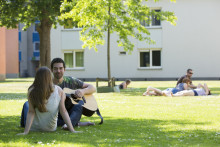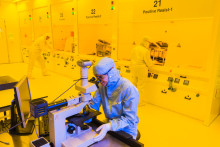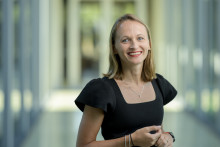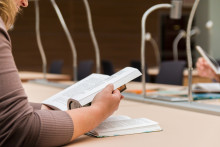This is the first time that the ERC will hand out these Advanced Grants to top scientist for breakthrough research projects. Out of almost one thousand applications in the field of `Physical Sciences and Engineering,' there were only 105 grants awarded, and nine of these are based in the Netherlands. The total subsidies amounted to a sum of 250 million. Van den Berg applied for 3.5 million euros. `But, of course,' said the UT professor, `I'm really happy with the 2.4 million euros. Without this grant money, we wouldn't be able to do the research in the first place.'
The research project eLab4Life concerns the development of a future lab-on-a-chip systems, where a pocket-sized laboratory is developed that can give blood test results on the spot. This is called `point of care' diagnostics. Until now, this was mostly preformed with optical technology. Now, Van den Berg wants to develop special nanoscale structures to create electric fields with which cells or molecules can be studied. `A significant part of this project was the so-called redox-cycling effect, which we can use in developing a sensitive nanoscale detection method. Next to these developments, we want to further study cell surfaces on nanoscale, for instance, electrofusion of cells: a method that is used to produce medicine. Through our research efforts, this can be done more efficiently in the future.'
Van den Berg plans to at least purchase a scanning electrochemical microscope (SECM) with the 2.4 million euros. `The microscope costs 300,000 euros. No, it's not been ordered yet. First, everything needs to be signed for the grant.' This microscope will be used in several projects. `We will cooperate with the Tissue Engineering group (led by professor Clemens van Blitterswijk) to study cell surfaces.' In addition, five PhD-students and one technician will be appointed. `One PhD student will be in the research group of Jurriaan Huskens, who we already work with in close cooperation.'
`If this research project succeeds, it will signify a huge breakthrough with interesting applications. We cannot predict precisely what the final result will be, but from my own experience, I can tell that during a project you will always encounter new things that will need a solution.'
According to Van den Berg, the medical and pharmaceutical world closely follows the developments of eLab4Life. `They could find a huge benefit with the results of our project and make a big step forward, for example, to develop new medications.'
Trans. Henriëtte van Dorp







